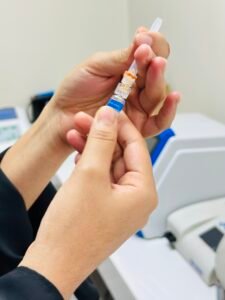
Vaccination is a medical process in which a person is administered a vaccine to help protect them from specific infectious diseases. Vaccines contain weakened or inactivated forms of viruses or bacteria, or parts of them, that stimulate the immune system to produce antibodies. This prepares the immune system to fight off the disease if it is encountered in the future.
Importance of Vaccination:
Prevention of Diseases: Vaccines help prevent the spread of infectious diseases by enabling the body to develop immunity without suffering from the actual disease.
Herd Immunity: When a large portion of the population is vaccinated, the spread of contagious diseases is reduced, offering protection to those who cannot be vaccinated (e.g., infants, elderly, or those with weakened immune systems).
Eradication of Diseases: Vaccination has played a crucial role in eradicating or significantly reducing the prevalence of several deadly diseases, such as smallpox and polio.
Cost-Effective Healthcare: Preventing diseases through vaccination is far less expensive than treating them. It reduces healthcare costs, hospitalizations, and long-term medical treatments.
How Vaccines Work:
Vaccines stimulate the immune system by introducing a harmless version of the disease-causing pathogen (virus or bacteria). This can be a weakened form of the pathogen, a part of the pathogen (like proteins), or an inactivated version. The immune system then recognizes this foreign substance, develops antibodies, and “remembers” the pathogen. If the body encounters the actual disease in the future, the immune system can quickly respond to prevent infection.
Types of Vaccines:
1. Live Attenuated Vaccines: These contain a weakened version of the virus or bacteria (e.g., measles, mumps, and rubella vaccine). They produce a strong and long-lasting immune response but are not suitable for people with weakened immune systems.
2. Inactivated (Killed) Vaccines: These contain viruses or bacteria that have been killed or inactivated (e.g., polio vaccine). They are safer for people with weakened immune systems but may require booster shots.
3. Subunit, Recombinant, and Conjugate Vaccines: These contain pieces of the pathogen, such as proteins, which stimulate an immune response (e.g., HPV vaccine, Hib vaccine).
4. Toxoid Vaccines: These contain inactivated toxins produced by bacteria, which trigger an immune response without causing harm (e.g., tetanus and diphtheria vaccines).
Benefits of Vaccination:
Protection from Life-Threatening Diseases:Vaccines protect individuals from serious illnesses that can cause death or long-term disability, such as measles, diphtheria, and influenza.
Reduced Spread of Diseases: When people get vaccinated, they reduce the spread of infectious diseases, protecting vulnerable populations, including infants, pregnant women, and the elderly.
Global Health Improvements: Vaccination programs have significantly reduced the global burden of diseases, leading to increased life expectancy and improved public health outcomes.
Common Vaccines and the Diseases They Prevent:
Diphtheria, Tetanus, and Pertussis (DTaP): Protects against respiratory infections and toxins.
Measles, Mumps, and Rubella (MMR): Protects against viral infections that can cause severe complications.
Polio Vaccine: Prevents poliomyelitis, a disease that can cause paralysis.
Influenza Vaccine: Protects against seasonal flu, which can lead to severe illness and death.
Human Papillomavirus (HPV) Vaccine: Protects against certain strains of HPV, which can cause cervical and other cancers.
Vaccination Schedules:
Vaccination schedules vary depending on the country and the specific vaccine. Generally, children are vaccinated early in life to provide protection from diseases before they are exposed to them. Booster doses may be given later in life to maintain immunity.
Conclusion:
Vaccination is one of the most effective ways to prevent infectious diseases, protect public health, and reduce the spread of illness. By getting vaccinated, individuals not only protect themselves but also contribute to the safety and well-being of their communities. The widespread use of vaccines has made it possible to control and even eradicate some of the deadliest diseases in human history.

